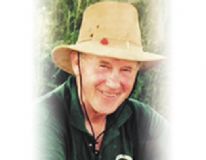Mr Bert Slader

BERT Slader, who died at his home in Newcastle on Tuesday, January 5, aged 85, was one of the legends of Irish walking.
Brought up in a terrace in Glenmachan Street off the Donegal Road in Belfast, he had his first taste of travel and adventure at the age of 10 in July 1940 when he was evacuated from Belfast to a farm near Moss-Side in North Antrim as German bombers targeted Belfast — an experience that cultivated a life-long interest in the great outdoors.
His first time under canvas was at a Boys’ Brigade summer camp in 1943 with the 38th Belfast Brigade on the shore of Carlingford Lough. Many camps would follow and Bert found himself drawn back to one place in particular — the Mountains of Mourne.
Bert was a pupil at Methodist College and was a star of the rugby field, representing and captaining his school. He was selected to play for Ulster Schoolboys and as an adult played for the senior Ulster team.
On leaving school Bert did a degree in Sports Studies at Loughborough University and teacher training at Stranmillis College. He taught at Dalriada, Kilkeel and Castlewellan High Schools.
He then joined the CCPR (Central Council for Physical Recreation) before moving to the Northern Ireland Sports Council where he became Deputy Director. He took early retirement in 1985 to indulge his passion for travelling and to write about his adventures.
Throughout his life Bert travelled extensively in Europe and Asia, mountaineered in Arctic Norway, the Alps and the Himalayas, and led expeditions to the mountains of Iran and the Hindu Kush in Afghanistan.
He was also one of the driving force behind the creation of the Ulster Way, Ireland’s first way-marked way, which set the standard for the others which followed. In 1958, inspired by the Dalriada Camping Club, Bert acquired a cottage in the Mournes which is now known as Spence’s Trust Cottage and is still used by groups of young people to this day.
In his capacity as Assistant Director of the Northern Ireland Sports Council, Bert oversaw many walking developments, including the setting up of Tollymore Mountain Centre near Newcastle, which introduced many thousands of young people to walking in the mountains of Ireland and abroad.
In 1985 Bert set out on his own to walk to Santiago de Compostela in northwest Spain along the ancient Pilgrim Road of St James. The first of his many books, Pilgrims’ Footsteps, recounts the stories of the people and places he met along the way.
This, in turn, inspired a ten-day walk to Santiago to raise funds for multiple sclerosis, MS Ireland in 1990. He led 15 more parties of walkers from Ireland, north and south, on this charity walk, as well as walks along the Great Wall of China, Goa, India and the Drackensberg Mountains of South Africa.
In 1987, Bert set out from Santiago de Compostela on a 600-mile journey, mainly on foot, from this northerly part of Spain to the south of Portugal. Following in the footsteps of the ancient Roman soldiers, Bert walked all the way to Vila Recall in the Algarve and wrote of his experiences in a book entitled Across the Rivers of Portugal.
Bert’s other books include An Echo In Another’s Mind, in which he recalls the people and places in his life in the mountains, particularly the Mournes in Co. Down and his experiences in the Pyrenees and the mountains of Iran; Footsteps In The Hindu Kush is the story of the people and mountains of Afghanistan, which Bert visited eight years before the Soviet invasion. He tells of the horsemen of the Panjshir, recounts ancient folktales told to him and recalls some amusing incidents such as when, after a dispute, an Afghan horseman smiled and said to him “The Irish and the Afghans are brothers – we like to argue and we like to fight”.
Beyond the Black Mountain, set in Ulster during the years 1939-1946, is an autobiographical tale which tells the story of growing up during the war in west Belfast. It features Bert’s adventures while cycling around Ulster in the days of strict food rationing and austerity.
Bert’s first novel entitled Belshade, is set in the Blue Stack Mountains of Donegal, in the French and Spanish Pyrenees and in the pilgrimage town of Lourdes, shortly after World War II. The novel is humorous and touching and, as you would expect, the background setting of the hills is absolutely spot on.
he Irish Pilgrim, a sequel to Belshade, is set in 1950 in Donegal, Paris, the South of France, the Pyrenees and along the ancient pilgrim Road to Santiago. The Templar Manu, the third novel of this trilogy, is set in France, Spain and the Pyrenees.
Freelance writer, lecturer, broadcaster and walker extraordinaire, Bert was awarded a Waterford Crystal Walker Award for 1997 in respect of his books on walking and his leadership of worldwide fund raising walks for multiple-sclerosis.
To sum up in Bert’s own words: “The real intent of the traveling has rarely been its declared purpose. But the further I go, the more I feel in touch with the quest. The secret of the grail is not to be found at the journey’s end but is the reward of the hopeful traveller.”
Canon Ian Ellis conducted Friday’s funeral service in St John’s Parish Church, Newcastle.
The sympathy of the community is extended to Bert’s wife, Eileen, children Dion and Jenifer, and the family circle.

